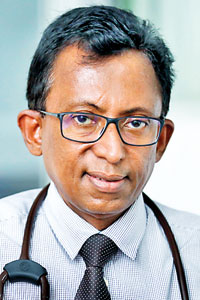News
Where is the pragmatic strategy, ask Specialists
- Concern over oxygen delivery to patients
- Call for apolitical experts to produce National Plan to combat COVID-19
No pragmatic decisions or strategy can be seen in place to face dire eventualities, warned the Association of Medical Specialists (AMS) this week, reiterating that “we seem to have failed to learn from lessons in India to avert such a crisis”.
“The number of COVID-19 patients is on the rise in Sri Lanka. It has exceeded 1,000 a day and is still rising. We wish to stress that we have already reached alarming figures if the number of cases per 1,000 people is calculated,” stated the AMS which is currently being led by President Dr. LakKumar Fernando.

Dr. LakKumar Fernando
Stressing that we all know that our existing capacity to treat ill patients (intensive care and high dependency) has reached its threshold, the AMS says that experts have clearly mentioned the higher infectivity and virulence of the current strain, warranting an increased need for oxygen dependency and intensive care. Since there is no firmly established cure for this disease, symptomatic treatment is the mainstay till recovery.
The AMS states: “We should ensure that there will be a constant and uninterrupted availability of oxygen supplied beds if we are to avert disaster. Apparently even a financially stronger regional giant, India, is facing immense hardships due to a shortage of oxygen right now.
“To the best of our knowledge there are two companies in Sri Lanka that supply oxygen to healthcare facilities and these manufacturers can easily increase their production almost three-fold. Together they now produce around 75 tons of oxygen, a portion of which is supplied for industrial use. They can divert all the oxygen they produce to the health sector if the need arises and Sri Lanka has a sufficient source to supply.
“However, the more important issue is the delivery of this oxygen to the patient’s bedside. The best way to do this is to have piped oxygen distributed from a central liquid oxygen tank rather than using cylinders. Unfortunately, the whole country has only 28 such liquid oxygen tanks (ranging from 3,000 litres to 20,000 litres) in hospitals. The two 20,000-litre tanks are at the National Hospital of Sri Lanka and the Peradeniya Hospital.
“With the current COVID-19 variant being highly transmissible, transporting patients to hospitals with larger tanks may not be an option as many of these hospitals mainly cater to non-COVID patients. The spread of COVID-19 within a hospital could also result in disaster.
“Therefore, under this system, we still have to depend largely on jumbo cylinders (each with 47 liquid litres) and produce 7,050 gas litres. Though heavy, needing more than a couple of people to move them, each jumbo cylinder may not last for more than a few hours in a highly oxygen dependent patient.
“Managing oxygen between hospitals and delivering it to the individual patient will certainly need intelligent planning and extreme coordination of production, storage and efficient delivery. For this, we will need to utilize the services of experts in these fields to design and implement the best national plan and it should be kept strictly apolitical. If such action is not taken at this crucial juncture, we will be another nation which has ‘planned to fail’ as we have ‘failed to plan’.”
Meanwhile, pointing out that a degree of complacency and over-confidence can take Sri Lanka to a critical point faster, as has happened in some countries, the AMS urges that “prevention” is the “best strategy”.
The AMS adds: “We need to do everything possible to prevent and slow down the spread. Even if a lockdown is needed, it is best to foresee and think ahead and be prepared to do it, if essential. Only the authorities who have the real information and data can make that decision. It should not be a political decision, but one based on scientific principles. It is the duty of the health authorities to submit the correct information and data to the political authorities without any delay.”


